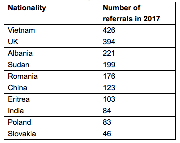The number of potential victims of labour exploitation referred as part of the framework set up to identify victims of modern slavery in the UK increased by 48 per cent from 2016 to 2017, according to analysis of National Crime Agency data by Kroll.
The data, which is extracted from the National Referral Mechanism (NRM), the framework in which potential victims of human trafficking or modern slavery are referred by authorised agencies such as police forces, the UK Border Force or Social Services, reveals that there were 2,327 referrals for labour exploitation in 2017, compared to 1,575 the previous year. Of these, 56 per cent (1,310) were adults, and 44 per cent (1,017) minors.
The number of adults referred increased by 18 per cent on the previous year, and the number of minors more than doubled, increasing by an alarming 117 per cent.
Kroll’s analysis reveals that Vietnam was the country of origin for the highest number of potential labour exploitation victims in the UK referred in 2017, with 426 individuals. This was followed by the UK, which has shot up from sixth place in last year’s report to second place this year, with the number of potential victims more than quadrupling from 85 to 394. Albania is third on the list with 221 potential victims.
Top ten countries of origin of victims referred for labour exploitation:

According to Kroll, the increased numbers cast a spotlight on an issue that continues to pose significant regulatory and reputational risks to businesses, particularly in sectors such as retail and manufacturing.
The introduction of the UK Modern Slavery Act, which passed into law on 26 March 2015, increased the maximum sentences available for modern slavery offences, strengthened law enforcement powers and coordination and implemented new measures to protect and support victims.
The Act’s Transparency in Supply Chains provision introduced a disclosure requirement for businesses with an annual turnover of £36 million or more after tax, obliging them to make public the steps they are taking to ensure that modern slavery offences are not taking place in either their business or their supply chain.
Benedict Hamilton, managing director, Kroll, explained: “The significant increase in referrals in the UK demonstrates that awareness and detection of modern slavery offences is improving. As global supply chains continue to grow in volume and complexity, many companies are adapting their due diligence processes and ongoing monitoring of third parties to address the heightened risks. We have been working closely with clients to help protect their supply chains and reputations through tailored combinations of open source profiling, intelligence gathering, data mining and on-site inspections.
“While almost any business could be exposed to modern slavery, the risks are intensified when a company uses third party agents to source labour, or sources goods or services through convoluted or opaque supply chains. It’s important for companies to adopt an appropriate, systematic approach which enables them to tackle the issue head on and help eradicate modern slavery from global supply chains.”


